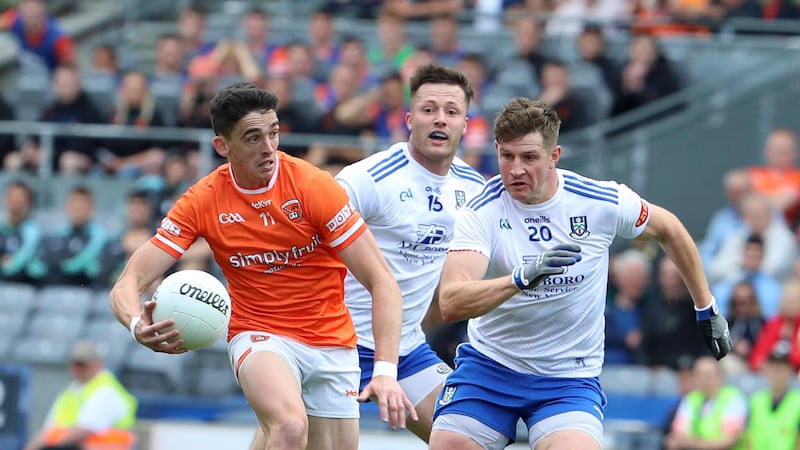AIDAN O’Rourke says there’s little point in debating the merits of the new rules for Gaelic football and that teams simply must adapt and try to find opportunity in them.
After a successful spell with the Armagh minors last season, Armagh’s 2002 All-Ireland winning defender has hooked up with the Kildare senior footballers for the second time in his coaching career.
While coaches and players are grappling with the seven new rule enhancements from the Football Development Committee [FRC], O’Rourke gets a sense that 12 v 11 scenarios will quickly become a “massive feature” in the new version of Gaelic football.
He tentatively forecasts higher points tallies and less goals, with plus-one defensive systems dying hard, especially when the real jeopardy of Championship football kicks in later in the year - and half-jokingly predicts the 2025 Player of the Year will be a goalkeeper.
“There is a massive amount of changes and grey area where people don’t quite know how it’s going to pan out. I get frustrated with the process a lot of the time and have been very frustrated with this process this time around.
“Ultimately, though, my outlook is this is opportunity. I wholeheartedly believe that, and the teams that adapt quickest are going to get a jump here.
“In my role as a coach, it doesn’t matter what I think about the rules and therefore there is no value in me dwelling on rules that I may not think are good.
“I haven’t spent any time with our coaches or players saying: ‘That rule is no good, that’s not going anywhere…’ They are what they are. There is a real possibility that some of them will get tweaked by the end of the League.”
O’Rourke envisages goalkeepers being regularly involved in the attacking play to create 12 v 11 scenarios.
“The FRC has basically anointed the goalkeeper here and if played correctly – and I’m half joking here – the three Player of the Year nominees for 2025 might all be goalkeepers.
“Teams are absolutely going to be looking at outfield options [as goalkeepers]. And the 12 v 11 will be a massive feature.
“It will become the most fruitful type of attack because there is a misconception at the minute among those who haven’t seen the games that there will be a lot of three-v-three contests because you have to keep three up, but that won’t be the case.
“Teams are going to keep a plus-one or keep more back. Certainly, my experience so far has been teams getting across the halfway line, getting the keeper across the halfway line and then having one extra to attack with.”
The rule that’s “going down worst”, O’Rourke has observed, is the stiff punishment behind the 50-metre advancement rule where if a player commits a foul they must hand the ball back to their opponent. This new rule is designed to speed up the play and to eradicate indiscipline.
“It’s a sledgehammer to break a nut,” O’Rourke said.
O’Rourke has always been among those who believe the game should be allowed to evolve naturally and that in some of these major rule tweaks Gaelic football might regress in areas.
“If you step back for a second, the game needed something but I don’t think it needed a pile. I do think they’ll look at some of these rules and see they’ll not make any difference.
“The game by and large was in a very good place. As a spectacle, it was becoming very predictable and samey. What these rules might do is open up other styles of play and other opportunities for teams to play with different strengths.
“So, there might be more of a contrast in styles with these new rules than there has been in recent years. Teams had become very good at the way the game was being played and might now be frustrated with these changes, and that’s understandable.
“They’ve maybe been building for three, four or five years and all of a sudden the rules are pulled from under them and they have to re-style game-plans, patterns of play and habits. But that’s the same for everybody and it’s about adaptability.”
O’Rourke has been a big admirer of the skillsets of modern players all over the field in the last decade while also being intrigued by the natural evolution of the goalkeeper kick-out and their increasing adeptness at finding runners through the eye of a needle.
As a result of some of the rules enhancements, a knock-on effect is “parts of the game will go backwards”.
The Dromintee man added: “There is something innate in me that rails against trying to steer the evolution of the game in a certain direction.
“I understand the reasons why. There is a revenue element here – people watching the games on TV, paying into games, neutrals going to games are falling.
“So that’s having a long-term impact on everything. That’s nothing to do with the FRC, but it’s perhaps part of the Association’s thinking here.”







